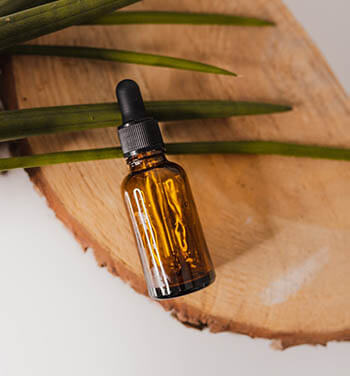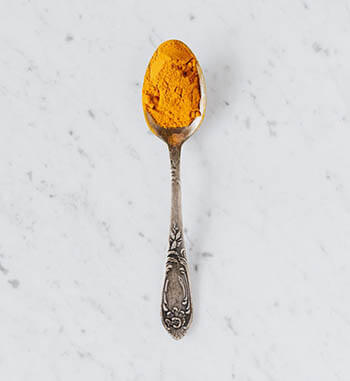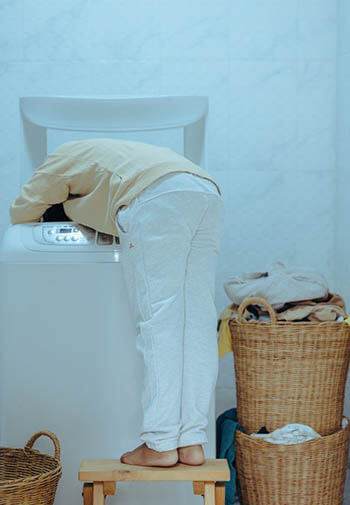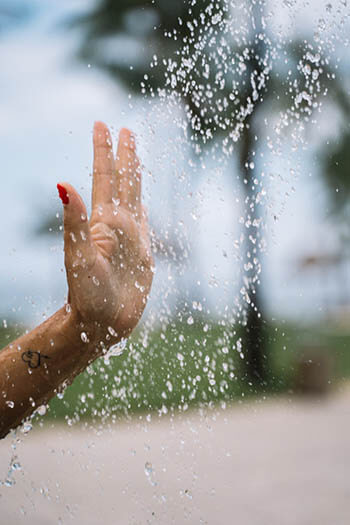Skin conditions are never pleasant, and scabies is no exception. Scabies is a distinctive and highly contagious skin disease that's caused by mites called Sarcoptes scabiei, and causes severe itching and a painful, inflamed rash. Some skin diseases will go away without effective treatment, but scabies is unfortunately not one of them. Left unchecked, the infection will only get worse.
While you will usually need to seek medical attention to treat scabies, you might also try various at-home remedies. Allergies or other reactions to medication could seem unappealing.
When you go to your doctor for scabies treatment, ask about DIY remedies you might try. It's worth noting that scabies is highly contagious, so it's important to start treating the infection as soon as possible. The good news is, scabies is completely treatable. The sooner you act, the sooner you can banish the problem.
What Is Scabies?
A scabies rash is caused by mites that burrow into the skin and cause itchy, red bumps, which blister and spread over the skin. Once underneath the skin, the mites lay eggs. The eggs hatch and the cycle of itchiness and rash spreading begin all over again.
Sounds horrible, right? It gets worse. Scabies is very contagious. A person can get scabies via clothes, linen, sexual contact, and direct skin contact. That means that if one member of a family contracts the rash, the other family members are at a high risk of catching it, too. Scabies can be passed on in places with a lot of close physical contact. Daycare centers, schools, locker rooms, and other similar places can spread infections like scabies quickly and easily.
Perhaps you're feeling itchy just thinking about it.
If you have scabies, you will certainly notice. The symptoms of scabies include red, irritated, and blistered skin on the hands, face, genital area, or soles of the feet, and the area will be extremely itchy. The itching may get worse during the night. It's never a good idea to scratch itchy skin rashes, and scabies is no exception. Without treatment for scabies, the rash will spread and the itching will get worse, as the scabies mites multiply.
Scratching is almost impossible to resist. However, it can damage the skin and leave you susceptible to infection. It can also cause the rash to spread. In the end, scratching only provides temporary relief. While the scabies is untreated, the rash and subsequent discomfort will continue.
Beware of "treatments" that do nothing but provide relief from the itching. Remember, the itching and the rash are only a symptom of the root cause, which is the skin mites and their eggs. To completely rid yourself of the infection, you need to get rid of scabies mites - and their eggs. Some treatments kill the scabies mite problem, but not the eggs. This is no good as a long-term solution.
Even if your chosen treatment is working, be very careful about spreading the rash. Never share clothes, towels, or other personal items, and avoid sexual contact while treating scabies. You'll likely need to thoroughly clean your house, washing all the fabrics you can. If something can't be washed, seal it away in a plastic bag just in case. While this is time-consuming and a little annoying, it's necessary to keep yourself (and others) free of the scabies rash. You should keep this cleaning routine up during and after your treatment, just to be safe.
So, is it possible to combat crusted scabies at home, without any treatment at all? While some individuals have certainly seen impressive results, not all official tests have been completely conclusive. Results vary, and while you're trying out a new treatment, you should be careful about spreading the rash in the meantime. To be on the safe side, it's usually best to consult a health expert for medical advice before trying any new remedies.
If you're pregnant, breastfeeding, or have some other health condition, always talk to your doctor before trying to treat scabies at home. It's better to be safe than sorry, and with a contagious skin condition such as scabies, you should err on the side of caution.
Home Remedies for Scabies
Home remedies for itchy skin diseases like scabies can work to remove the infection, or at least help to ease the itchiness. Let's take a look at a few at-home remedies that you can use to treat or manage a scabies infection.
1. Aloe Vera


Aloe vera is a tried and tested product for dealing with unpleasant skin diseases. Used to soothe itchiness and burns, when applied topically, aloe vera can soothe and even help to treat scabies rashes.
However, be sure that you're buying pure aloe vera. Some commercial aloe vera gels have additives and additional ingredients, which can dilute the aloe vera's effectiveness. Aloe vera may even work to kill the mites in the skin, although it likely won't work on the eggs.
2. Tea Tree Oil


Tea tree oil is a powerful antibacterial and anti-inflammatory oil. Known for its strong, medicinal scent, tea tree has been long connected with healing. It can even be used as an antifungal treatment and works to relieve itchiness.
Tea tree oil can even kill scabies mites. However, it likely won't have any effect on the mites' eggs. So, if your scabies infection is very recent, there's a chance that tea tree can help you eliminate of it for good.
It's worth noting that tea tree oil can be very powerful. Only a few drops at a time are needed. If necessary, you can dilute the oil with a carrier oil. Use a cotton bud or ball to gently wipe the oil over the affected area. Repeat several times a day, and you should soon begin to see improvement. At the very least, tea tree oil should reduce your chances of infection, may prevent the rash from spreading, and should give you some relief from itchiness.
3. Clove Oil
There are a number of oils that can work well to combat scabies symptoms, including orange, lavender, lemongrass, peppermint, and thyme. However, clove is said to be the most effective out of them all.
However, studies into the effectiveness of clove oil are still in the beginning stages. While clove oil might soothe a scabies rash, you might still need additional medical treatment.


4. Neem
Neem oil is another product that may work to kill scabies mites. It's anti-inflammatory and antibacterial and can be found in soaps, shampoos, and creams. Neem is another oil that needs further human studies into how well it treats scabies symptoms. However, there is some evidence to show that neem oil helps to kill scabies mites in dogs. Killing some or all of the mites can lead to an improvement in the scabies rash, or may even get rid of it altogether.
Once again, you should use neem alongside some other scabies treatment. Even if neem is successful in killing scabies mites, it likely doesn't affect the mite eggs. This will lead to a reoccurrence of the infection, and you might still be contagious.
5. Tumeric


Tumeric has been known to help alleviate the symptoms of scabies, specifically itchiness. However, it does very little to deal with the actual infestation. Tumeric can be found in pastes, creams, and herbal teas.
It can be a good product to take alongside another scabies treatment to deal with itch and irritation symptoms. While turmeric may only suppress the symptoms of scabies, it can help you not to scratch while the treatment gets to work. This prevents subsequent infections and the spreading of the rash.
6. Spring Cleaning


Learning that you have a scabies infestation is a horrifying thing. It's well known for being very contagious, and this is certainly the case. Mites or their eggs can get caught in fabrics, specifically clothes, bed sheets, and other materials.
Wash all of your clothes and linens in hot water. While washing clothes won't treat the infestation, it will prevent it from spreading to others, or even spreading to other parts of your body. You might want to go one step further and clean as much of your home as you can (it might take your mind off the itching!).
Scabies can be easily passed on from person to person, so getting a scabies infestation doesn't necessarily mean that you live in a dirty home, or have bad hygiene practices. However, it's important to be extra careful about passing on the infestation to someone else. Never share clothes, towels, or anything personal with somebody else while you're suffering from scabies. It may even be a good idea to avoid close contact, since skin-to-skin contact may also pass on the infestation.
7. Good Hygiene Practices


Finding out that you have scabies may make you want to leap into a red-hot shower and scrub off all of your skin! The idea that mites have burrowed into your skin and are causing a rash is horrible and may make you feel dirty and uncomfortable. The physical itch and burning can also become unbearable.
Once again, a scabies infection does not mean that you have poor hygiene - it may simply mean that you came into contact with somebody who did. Staying extra vigilant with hygiene can help you from developing an infection in the rash. Warm baths and regular showers can help to soothe the itch. Regularly washing your clothes and linens prevents the mite eggs from lingering in the fabric.
These practices can help you prevent infecting anyone else until your infestation has cleared up. It will also prevent you from getting reinfected. Wash all fabrics in your home that you can. The scabies mite can survive for up to four days without a human host. Everyone in your household should go through the same cleaning routine, whether they're infected or not.
When to See a Doctor
Sometimes, despite our best efforts, we need a little extra help. You may want to check in with your doctor to make sure that your infestation is clearing up. Crusted scabies takes time to heal, maybe even several weeks. During this time, stay vigilant with your treatments and hygiene practices.
However, if the symptoms haven't begun to improve after several weeks, or are getting worse, it could be time to visit a health expert.
The first thing a doctor will do is to determine for sure whether your rash is scabies. Remember, scabies symptoms may be caused by something else. Once they have determined that your scabies really is just that, they may prescribe creams or even pills for more serious cases.
In conclusion, scabies is embarrassing, contagious, and uncomfortable health condition for any person - and entirely treatable. Whether you use natural remedies or you prefer to seek medical advice first, treating scabies can be very easy. If you're concerned at all, speak to a medical professional. And whatever you do, don't scratch it!

